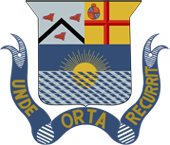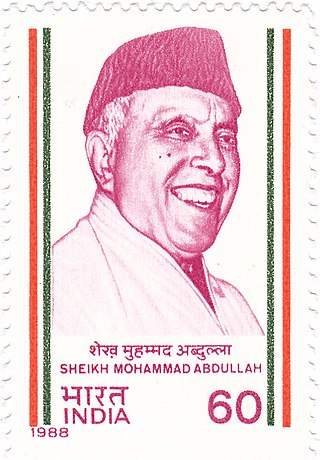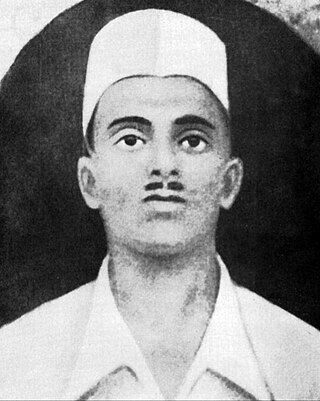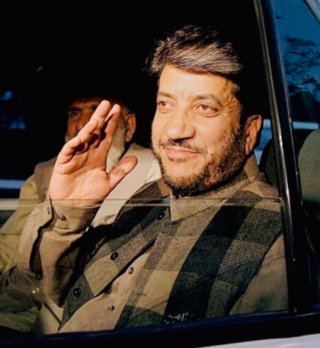
Mohammad Abdullah, also called Abdulla or Abdullah, is known for killing John Paxton Norman, Chief Justice in the High Court at Fort William in Bengal. [1]

Mohammad Abdullah, also called Abdulla or Abdullah, is known for killing John Paxton Norman, Chief Justice in the High Court at Fort William in Bengal. [1]
Justice Norman was accused for giving harsh sentence to freedom fighters. This was the main reason for the assassination. [2] [3]
In 1871, while Norman was coming down the steps of the Kolkata Town Hall, Abdullah, attacked him and stabbed him to death. He died on 21 September 1871. [4] [5] [6]

Abdullah Öcalan, also known as Apo, is a founding member of the militant Kurdistan Workers' Party (PKK).

Abdullah II bin Al-Hussein is King of Jordan, having ascended the throne on 7 February 1999. He is a member of the Hashemite, who have been the reigning royal family of Jordan since 1921, and is considered a 41st-generation direct descendant of the Islamic prophet Muhammad.

The Jammu and Kashmir National Conference (JKNC) is a regional political party in Indian-administered Jammu and Kashmir union territory and Ladakh. Founded as the All Jammu and Kashmir Muslim Conference by Sheikh Abdullah and Chaudhry Ghulam Abbas in 1932 in the princely state of Jammu and Kashmir, the organisation renamed itself to National Conference in 1939 in order to represent all the people of the state. It supported the accession of the princely state to India in 1947. Prior to that, in 1941, a group led by Ghulam Abbas broke off from the National Conference and revived the old Muslim Conference. The revived Muslim Conference supported the accession of the princely state to Pakistan and led the movement for Azad Kashmir.

Presidency College is an art, commerce, and science college in the city of Chennai in Tamil Nadu, India. On 16 October 1840, this school was established as the Madras Preparatory School before being repurposed as a high school, and then a graduate college. The Presidency College is one of the oldest government arts colleges in India. It is one of two Presidency Colleges established by the British in India, the other being the Presidency College, Kolkata.

Sheikh Mohammad Abdullah was an Indian politician who played a central role in the politics of Jammu and Kashmir. Abdullah was the founding leader of the All Jammu and Kashmir Muslim Conference and the 1st elected Prime Minister of Jammu and Kashmir after its accession to India. He agitated against the rule of the Maharaja Hari Singh and urged self-rule for Kashmir. He is also known as Sher-e-Kashmir.
Champaran is a region in Bihar, India. It is now divided into two districts: East Champaran and West Champaran.

Ganjam district is a district in the Indian state of Odisha. Ganjam's total area is 8,206 km² (3,168 mi²). The district headquarters is Chhatrapur. Ganjam is divided into three sub-divisions: Chhatrapur, Berhampur, and Bhanjanagar. The Imperial Gazetteer of India 1908 lists Ganjam, along with the Thanjavur and South Canara districts, as the three districts of the Madras Presidency where Brahmins were most numerous. As of 2011, it is the most populous district of Odisha.

The Kashmir conflict is a territorial conflict over the Kashmir region, primarily between India and Pakistan, and also between China and India in the northeastern portion of the region. The conflict started after the partition of India in 1947 as both India and Pakistan claimed the entirety of the former princely state of Jammu and Kashmir. It is a dispute over the region that escalated into three wars between India and Pakistan and several other armed skirmishes. India controls approximately 55% of the land area of the region that includes Jammu, the Kashmir Valley, most of Ladakh, the Siachen Glacier, and 70% of its population; Pakistan controls approximately 30% of the land area that includes Azad Kashmir and Gilgit-Baltistan; and China controls the remaining 15% of the land area that includes the Aksai Chin region, the mostly uninhabited Trans-Karakoram Tract, and part of the Demchok sector.

Sukhdev Thapar was an Indian freedom fighter who fought against the British government for the freedom of India. He was a member of the Hindustan Socialist Republican Association (HSRA). He was executed along with Shivaram Rajguru and Bhagat Singh on 23 March 1931.
Although India is a parliamentary democracy, the country's politics has become dynastic or with high level of nepotism, possibly due to the absence of party organizations, independent civil-society associations which mobilize support for a party, or centralized financing of elections. The dynastic phenomenon is present at the national, state, regional, and district level. The Nehru–Gandhi family has produced three Indian prime ministers, and family members have largely led the Congress party since 1978. The Bharatiya Janata Party (BJP) also has several dynastic leaders. In addition to the major national parties, other national and regional parties such as Dravida Munnetra Kazhagam (DMK), Shiromani Akali Dal, Shiv Sena, Samajwadi Party, Rashtriya Janata Dal, Janata Dal Secular, Jharkhand Mukti Morcha, Kerala Congress, Jammu & Kashmir National Conference, Indian Union Muslim League, AIMIM, and the Nationalist Congress Party are all dominated by families, mostly those of the party founders.
The Karan or Karana is a community found in the state of Odisha in India. The post of Karana used to be a professional designation that was occupied by literate peoples. They held Karanam posts in some parts of Andhra Pradesh, where they speak Odia and played a similar role in Odisha to that of the Kayasthas of West Bengal and Bihar. In the social hierarchy of Odisha they rank next to Brahmins. They exclusively served the ruling powers as their ministers, advisors, governors, military commanders, record keepers and dewans. They owned most Zamindaris in Odisha. They have the highest literacy caste-wise and are highly prosperous. Today they are a politically dominant community and have reigned over the politics of Odisha for 50 years.

Hans Raj Khanna was an Indian judge, jurist and advocate who propounded the basic structure doctrine in 1973 and attempted to uphold civil liberties during the time of Emergency in India in a lone dissenting judgement in 1976. He entered the Indian judiciary in 1952 as an Additional District and Sessions Judge and subsequently was elevated as a judge to the Supreme Court of India in 1971 where he continued till his resignation in 1977.

Shabir Ahmad Shah popularly known as Shabir Shah, in Kadipora, Anantnag, Kashmir is the founder and president of the Jammu and Kashmir Democratic Freedom Party (JKDFP), one of the main separatist political organizations seeking "right of self-determination" to Jammu and Kashmir.

Harohalli Srinivasaiah Doreswamy was an Indian journalist and activist. He was a member of the Indian independence movement, and became a centenarian in April 2018. He ran the publication house of Sahitya Mandira and the Indian nationalist newspaper Pauravani during the British Raj and the period afterwards. The historian Ramachandra Guha describes him as the "conscience of the state (Karnataka)" due to his activism.
Sir John Paxton Norman was an English jurist who the acting chief Justice of the Calcutta High Court. He was assassinated in 1871.
Edward R. Gallagher is a retired United States Navy SEAL. He came to national attention in the United States after he was charged in September 2018 with ten offenses under the Uniform Code of Military Justice. In the most prominently reported offense, he was accused of fatally stabbing an injured 17-year-old ISIS prisoner, photographing himself with the corpse, and sending the photo to friends.

Murshidabad University is a public state university in Berhampore, Murshidabad, West Bengal. The university was established in 2021 by the West Bengal government under The Murshidabad University Act, 2018.
{{cite book}}: CS1 maint: numeric names: authors list (link)